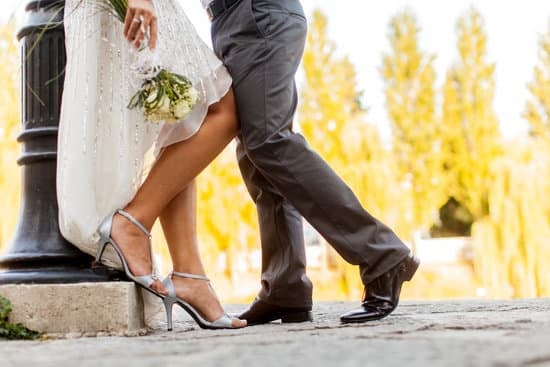Are you in the midst of planning your dream wedding and can’t decide between an A-line or a ball gown wedding dress? Look no further. In this article, we will explore the key differences between these two popular wedding dress styles to help you make an informed decision on your big day. From characteristics and features to body types and fabric choices, we’ve got you covered.
When it comes to choosing the perfect wedding dress, the decision can be overwhelming. A-line vs ball gown wedding dresses is a common debate among brides-to-be, and for good reason. Both styles offer unique characteristics that cater to different preferences and body types. Understanding the differences between A-line and ball gown wedding dresses is crucial in finding the best fit for your special day.
In the following sections, we will delve into the specific characteristics and features of both A-line and ball gown wedding dresses. We will also discuss how each style complements different body shapes as well as the various fabric choices available for each dress style.
Additionally, we will provide styling tips to help you complete your bridal look with the perfect accessories. So sit back, relax, and let us guide you through the process of choosing the ideal wedding dress for your unforgettable day.
A-Line Wedding Dresses
Introduction to a-Line Wedding Dresses
A-line wedding dresses are a classic and versatile option for brides looking for a flattering silhouette. The name “A-line” is derived from the dress’s shape, which resembles the letter “A.” These dresses are fitted at the bodice and flow out to the ground in an unbroken line, creating a sleek and simple look. A-line wedding dresses are known for their ability to flatter various body types, making them a popular choice among brides.
Characteristics of a-Line Wedding Dresses
One of the key characteristics of A-line wedding dresses is their universally flattering silhouette. The fitted bodice helps accentuate the waist, while the gradual flare of the skirt creates an elongating effect, making it a great choice for petite brides. Additionally, the A-line style is versatile and can be found in various neckline options, sleeve lengths, and fabric choices, allowing brides to customize their look to suit their personal style.
Features of a-Line Wedding Dresses
A-line wedding dresses often feature delicate details such as lace overlays, beading, or intricate embroidery. They can also come with options for trains of varying lengths, allowing brides to choose a style that fits their desired level of formality. The versatility of A-line wedding dresses makes them suitable for both casual outdoor weddings and formal indoor ceremonies, giving brides plenty of options when it comes to selecting the perfect dress for their special day.
When considering an A-line vs ball gown wedding dress, an A-line dress may be the ideal choice for brides who desire a timeless and elegant look without feeling too restricted by heavy fabrics or excessive volume. With its universally flattering silhouette and customization options, it’s no wonder why many brides opt for an A-line wedding dress for their big day.
Ball Gown Wedding Dresses
When it comes to choosing the perfect wedding dress, many brides opt for a classic ball gown silhouette. This style is characterized by a fitted bodice and a full skirt that begins at the natural waist, creating a romantic and princess-like look. Here are some key characteristics and features of ball gown wedding dresses:
- Structured Bodice: Ball gown dresses typically feature a structured bodice that is designed to provide support and shape to the upper body. This can include boning, corsetry, or built-in cups to ensure a flattering fit.
- Full Skirt: The hallmark of a ball gown wedding dress is its full skirt, which creates volume and drama. This voluminous skirt can be achieved through layers of tulle, organza, or other lightweight fabrics, giving the dress its distinctive fairytale-like appearance.
- Waist Emphasis: One defining feature of ball gown dresses is the emphasis on the natural waist. The fitted bodice seamlessly transitions into a defined waistline before cascading into the voluminous skirt, creating an exaggerated hourglass shape.
- Elegant Details: Ball gown wedding dresses often feature intricate detailing such as lace overlays, beading, embroidery, or embellishments. These elegant touches add texture and visual interest to the overall look of the dress.
For brides who want to make a grand entrance and exude timeless elegance on their wedding day, a ball gown wedding dress is an excellent choice. Its classic silhouette and fairy tale appeal make it an ideal option for formal and traditional weddings in grand venues such as ballrooms or cathedrals.
Overall, ball gown wedding dresses offer brides the opportunity to embrace their inner princess and create a romantic and unforgettable bridal look. Whether adorned with delicate lace or shimmering beadwork, this iconic silhouette has stood the test of time as a symbol of grace and beauty on one’s special day.
Body Types
When it comes to choosing the perfect wedding dress, it’s important to consider your body type to find a style that best complements your figure. The decision between an A-line and ball gown wedding dress can greatly depend on your body shape and what you feel most comfortable in. Let’s take a closer look at which dress style suits which body shape best.
A-Line Wedding Dresses for Different Body Types
A-line wedding dresses are known for their universally flattering silhouette that cinches at the waist and gently flares out towards the hem, resembling the shape of an uppercase “A”. This makes A-line dresses suitable for various body types, including pear-shaped, apple-shaped, hourglass, and petite figures. The cinched waist creates a defined look while the skirt gracefully skims over the lower body, making it a versatile choice for many women.
Ball Gown Wedding Dresses for Different Body Types
On the other hand, ball gown wedding dresses are characterized by their fitted bodice and voluminous skirt that creates a dramatic and princess-like effect. This style is ideal for brides with hourglass or pear-shaped figures as it accentuates the waist while beautifully balancing out the proportions of the hips. It can also add curves to brides with straight or rectangular body shapes by creating the appearance of a fuller bust and hips.
Choosing Based on Body Type
Ultimately, when deciding between an A-line vs ball gown wedding dress, it’s essential to consider which style will best flatter your specific body type. While A-line dresses are great for creating a streamlined look and adding subtle volume to a variety of figures, ball gowns are perfect for making a bold statement and enhancing certain curves. By understanding how each dress style complements different body shapes, you can confidently choose the right silhouette for your special day.
Fabric Choices
The type of fabric used in a wedding dress can greatly impact the overall look and feel of the gown. When it comes to A-line vs ball gown wedding dresses, the choice of fabric can make a significant difference in the silhouette and style of each dress.
A-line wedding dresses are known for their classic and versatile shape, making them suitable for various types of fabrics. Light and flowy fabrics such as chiffon and organza are popular choices for A-line dresses, giving them an airy and ethereal look perfect for outdoor or beach weddings. On the other hand, heavier fabrics like satin and mikado can create a more structured and formal appearance, making A-line dresses ideal for traditional indoor venues.
Ball gown wedding dresses, with their voluminous skirts and fitted bodices, often utilize more dramatic and luxurious fabrics. Tulle is a popular choice for ball gown dresses, creating a soft and romantic look that is perfect for fairytale-inspired weddings. Other options like lace and taffeta can also be used to add texture and dimension to the gown, enhancing its overall opulence.
When considering fabric choices for A-line vs ball gown wedding dresses, it’s important to take into account not only the desired aesthetic but also practical factors such as comfort and movement. Ultimately, the right fabric can truly elevate the overall look of each dress style.
| A-Line Wedding Dresses | Ball Gown Wedding Dresses |
|---|---|
| Chiffon or Organza | Tulle |
| Satin or Mikado | Lace or Taffeta |
Pros and Cons of a-Line Dresses
A-line dresses are a popular choice for brides seeking a classic, elegant look on their wedding day. These dresses are characterized by a fitted bodice that gradually flares out to the hem, forming an “A” shape silhouette. One of the main advantages of A-line wedding dresses is their versatility.
They are flattering on many different body types, making them a great option for brides of all shapes and sizes. Additionally, the A-line style is timeless and can suit various wedding themes, from casual beach ceremonies to formal ballroom receptions.
Another pro of A-line dresses is their comfort. The soft, flowing skirt allows for ease of movement and makes the dress comfortable to wear throughout the day and night. Brides who want to dance and move around freely at their reception will appreciate the flexibility of an A-line gown.
On the other hand, one potential downside of A-line dresses is that they may not provide as much drama or impact as ball gown styles. For brides who want a more dramatic, statement-making look, an A-line dress might not be the best choice.
In terms of practicality, A-line dresses tend to be easier to manage than ball gowns. They are lighter in weight and often require less fabric, making them more convenient for outdoor or destination weddings where mobility and ease of transport are important factors to consider.
However, some brides may find that the simplicity of A-line dresses lacks the wow factor they desire for their special day. Ultimately, when considering an a-line vs ball gown wedding dress, it’s essential for each bride to weigh these pros and cons against her personal preferences and vision for her wedding attire.
Pros and Cons of Ball Gown Dresses
Ball gown wedding dresses are a popular choice for brides who want to make a dramatic statement on their big day. These dresses are characterized by their fitted bodices and full, voluminous skirts that flare out from the waist, creating a classic and romantic silhouette.
One of the main advantages of wearing a ball gown wedding dress is the undeniable princess-like feeling it exudes. The voluminous skirt can create a stunning and breathtaking look as the bride walks down the aisle, making her feel like a true royalty.
However, one downside of choosing a ball gown wedding dress is that they can be quite heavy and cumbersome to wear, especially for brides who are planning on dancing the night away at their reception. Additionally, the full skirt may not be ideal for certain venues or outdoor weddings where mobility and ease of movement are important.
Another consideration with ball gown dresses is that they may not suit all body types equally. Brides with petite frames may find that the volume of the skirt overwhelms their figure, while those with pear-shaped bodies will need to ensure that the proportions of the dress flatter their shape.
Despite these drawbacks, many brides continue to choose ball gown wedding dresses for their fairy-tale bridal look. With careful consideration and proper fitting, these dresses can make any bride feel like she’s stepped out of a storybook and into her own happily ever after.
Whether it’s a grand ceremony in a castle or a formal affair in an elegant ballroom, there’s no denying the allure of a stunning ball gown wedding dress for those looking to make a lasting impression on their special day.
Styling Tips
When it comes to choosing the perfect wedding dress, finding the right style is just the first step. Once you have chosen between an A-line vs ball gown wedding dress, it’s important to consider how to accessorize and style each dress to maximize the overall bridal look. The way you accessorize can completely transform the feel of your wedding dress, so it’s essential to carefully select the right accessories that complement your chosen style.
For A-line dresses, you can enhance the classic and elegant silhouette with delicate jewelry such as a simple pendant necklace or stud earrings. Avoid overwhelming the clean lines of an A-line gown with heavy statement jewelry – instead, opt for dainty pieces that accentuate the gown’s natural beauty. Consider adding a satin sash or beaded belt to cinch in the waist and add a touch of sparkle.
On the other hand, ball gown dresses allow for more grand and dramatic accessories. To complement the full skirt and fitted bodice of a ball gown, consider wearing a bold statement necklace or chandelier earrings for added glamour. You can also add a sparkly tiara or headpiece to enhance the princess-like feel of a ball gown wedding dress.
When it comes to styling your hair and makeup with these different styles, keep in mind that simplicity is key for A-line dresses while glamor and extravagance go well with ball gowns. Additionally, consider your choice of bouquet – a small delicate bouquet will complement an A-line dress, while a larger, more opulent arrangement will suit a ball gown.
By carefully selecting your accessories and styling choices based on your chosen dress silhouette, you can create a cohesive look that maximizes the overall bridal ensemble.
Final Thoughts
In conclusion, both A-Line and Ball Gown wedding dresses offer unique characteristics and features that cater to different preferences and body types. A-Line dresses are known for their versatility and flattering silhouette, making them suitable for most body shapes. On the other hand, Ball Gown dresses exude a more dramatic and princess-like look, ideal for brides who want to make a statement on their special day.
When considering which dress style is the best choice for different types of weddings and venues, it’s important to take into account the overall theme and atmosphere of the event. For traditional church weddings or grand ballroom venues, a Ball Gown wedding dress would be fitting as it complements the formal setting. Conversely, A-Line dresses are perfect for beach weddings or more casual outdoor ceremonies due to their lightweight and flowing design.
Ultimately, the decision between an A-Line vs Ball Gown wedding dress comes down to personal preference, body type, and the specific details of the wedding day. Both styles have their own pros and cons, so it’s essential for brides-to-be to try on various silhouettes to see which one best suits their individual style and vision for their special day.
With the right styling tips and fabric choices in mind, any bride can confidently choose between these two classic wedding dress styles.
Frequently Asked Questions
What Is the Difference Between an a-Line Dress and a Ball Gown?
The main difference between an a-line dress and a ball gown is the silhouette. An a-line dress is fitted at the bodice and then gradually flares out from the waist to create an “A” shape. On the other hand, a ball gown has a fitted bodice and a very full skirt that begins at the waistline.
What Is the Difference Between a-Line and Ballroom?
The difference between an a-line and ballroom dress lies in both the silhouette and the style. A-line dresses have a more universally flattering A-shaped silhouette, while ballroom gowns typically have a tighter fit around the hips and then flare out dramatically at or below the knees to allow for lots of movement on the dance floor.
What Is an a-Line Wedding Gown?
An a-line wedding gown features an elegant, timeless silhouette that is narrow at the top and gently flares out from the waist down, resembling the shape of an uppercase letter “A.” This style can suit various body types and can range from simple and understated to elaborate with embellishments or lace detailing.
Overall, it’s a versatile choice for brides seeking a classic yet modern look for their special day.

I have been involved in marriages for over 20 years helping couples and singles understand more about them.





